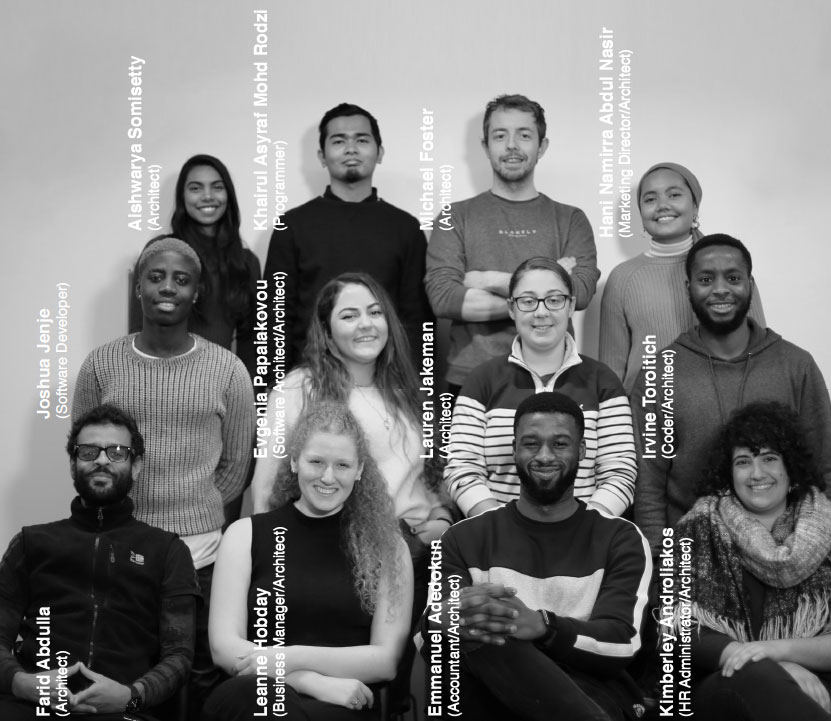Professional Studies appears across our courses and steadily prepares our students for the expected and unexpected encounters and experiences of architectural practice and the construction sector. In the BA (Hons) this is addressed through the Humanities strand, that asks about the historic and contemporary role of the architect and considers the manifold tasks that architects undertake. In MArch 1, two studio projects, PS1 and PS2, directly address two of the most salient issues of today, namely housing and building re-use. These projects are directed through the atelier system and engage with all of the statute, policy and guidance involved in designing buildings that are energy efficient, environmentally responsive and ecologically sound whilst considerate of other social and cultural factors informing their development.
In PS3 2019-20, we refocused the brief to respond to new challenges but always facilitating emergent thinking to develop mindsets, skillsets and toolsets through both independent learning and collaboration for collective intelligence, while encouraging a wide range of responses from the traditional to the radical. We began the year with a series of questions and statements to enable the students to understand the diversity of practices associated with the field of architecture.
- Traditional Practice is ‘broke’ (in both senses), how do we fix it?
- The development systems/processes may not be ‘broke’ as they were never actually designed or worked in the first place… How do you analyse and make them ‘better’?
- There is no such thing as a permanent boundary, Architecture is evolving into diverse and specialist roles - how must we prepare?
- What is our Professional Identity?
- How did we get here and where are we going?
- Can you be ‘trans-disciplinary’ if you don’t have a discipline to begin with?
- What are the current/future challenges [problems/opportunities] and how to act on them?
- What is the future and transformative capacities of Architects/Architecturally Trained?
- If change is necessary then from what, to what, and how?
- Value the wisdom of the Architect, not the title - What is out value to client and wider society?
- What are the shapers + barriers of your futures?
- What is your definition of ‘Architectural Production?
We asked the 160 final year MArch students to self-organise into 13 proto-practice groups mixing atelier cultures to create unique synergies in order to focus on enquiry and problem-based learning, evidence-based decision-making and designed solutions to the wicked problems we face. Using existing studio projects, the groups were tasked to produce reports and presentations that considered the effectiveness of Business Management (a vehicle for architectural production), Project Management (the development process) and Group Performance Review. Individual work was founded on these reports and asked for reflections in the form of a Think Piece on future scenarios, a SWOT analysis of career trajectories into scenarios and a letter of advice to future students.
We held a symposium, Achieving Quality in Construction, chaired by Jane Duncan (Past President, RIBA) including architects, clients, estate managers, developers, contractors, manufacturers, approved inspectors, sustainability experts and futurists. We also strengthened our partnership with RIBA by arranging our students' participation with the Guerilla Tactics conference. We embraced networked learning and welcomed 70+ experts from all over the world making manifest communities of inquiry and practice to create a reflective knowledge exchange forum. This enabled the transfer of tacit knowledge through discourse and encouraged the questioning of contemporary and future definitions of professionalism in relation to architecture. In so doing, we acknowledged the ever evolving contemporary fields of dissolving professional boundaries within the rapidly changing disruptive contexts of complexity and contradiction.
We facilitated a dialogue on adaptability between the orthodoxy of conventional architectural production and unorthodox alternatives at both the core and edges of the property, construction and creative industries. We explored diverse current and future forms of practice and engagement including collaboration, association, multi- and inter-disciplinary, systems design, digital fabrication, construction, development and research. We enabled focus on a range of contemporary challenges to architectural production, amongst them were design quality, ethics, value, fees, productivity, conservation, robotics and AI, the internet of things, design for mass assembly, off-site fabrication and the proliferation of data.
All in all, we seek to provide a foundation for a professional career that is underpinned by a capacity to be adaptable, resilient and imaginative in the face of rapidly shifting political, cultural, ecological and economic contexts.


